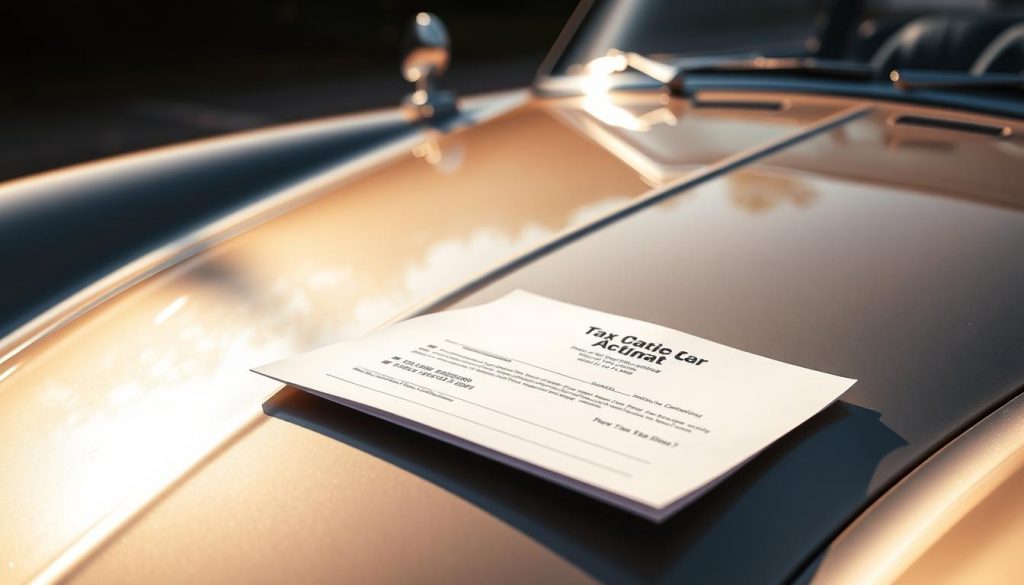When it comes to passing on cherished possessions to the next generation, understanding the implications of Inheritance Tax is crucial. For many, classic cars hold significant sentimental and financial value. However, the question remains: do these prized vehicles enjoy a tax exemption?
We are here to guide you through the complexities. In the UK, classic cars are considered part of the deceased’s estate and are subject to Inheritance Tax. This means that if the total value of the estate, including the classic car, exceeds £325,000, a tax rate of 40% may apply.
It’s essential to understand how this impacts your estate and what steps you can take to plan accordingly.
Key Takeaways
- Inheritance Tax applies to classic cars as part of the deceased’s estate.
- A tax rate of 40% is applicable on estates valued over £325,000.
- Proper estate planning is crucial to manage tax liabilities.
- Understanding the valuation of classic cars is key to tax planning.
- Seeking professional advice can help navigate Inheritance Tax complexities.
Understanding Inheritance Tax in the UK
The UK’s Inheritance Tax system can be complex, but it’s essential to grasp its fundamentals. Inheritance Tax (IHT) is a tax paid on the estate of someone who’s passed away, including all their assets, savings, and property.
What is Inheritance Tax?
Inheritance Tax is levied on the estate of the deceased before it’s distributed to the beneficiaries. It’s a significant consideration for estate planning, as it can substantially reduce the value of the estate passed on to heirs.
Current Rate of Inheritance Tax
The current rate of Inheritance Tax in the UK is 40% on estates valued over £325,000. It’s worth noting that most people (around 96%) aren’t affected by IHT as their estates fall below this threshold.
For estates valued between £325,000 and £500,000, there’s a reduced rate of IHT if certain conditions are met, such as gifting a portion of the estate to charity.
Who Needs to Pay Inheritance Tax?
Generally, the beneficiaries of an estate don’t pay Inheritance Tax directly. Instead, the tax is usually paid out of the estate before it’s distributed. However, in some cases, beneficiaries might need to pay IHT if they receive gifts or assets that are subject to IHT.
It’s also important to consider that certain gifts made during a person’s lifetime can be subject to IHT under specific circumstances, such as if the gift is made within seven years before the person’s death.

Definition of Classic Cars
Understanding what constitutes a classic car is essential for navigating the complexities of inheritance tax in the UK.
While there’s no strict definition, classic cars are generally considered to be vehicles of significant historical interest or those that have appreciated in value over time.
Criteria for Classic Cars
To be considered a classic car, a vehicle typically needs to meet certain criteria.
- Age: The vehicle should be of a certain age, often considered to be at least 15 to 20 years old.
- Historical Significance: Cars associated with significant historical events or figures can be considered classics.
- Rarity: Limited production models or unique variants can qualify.
- Condition: The vehicle’s condition, including its originality and state of preservation, plays a role.
Examples of Classic Cars
Examples of classic cars include:
- Iconic sports cars like the Jaguar E-Type or the Porsche 911.
- Luxury vehicles from renowned manufacturers such as Rolls-Royce.
- Cars with historical significance, such as those owned by famous individuals or used in significant events.

Market Value Considerations
The market value of a classic car is a critical factor in determining its status for inheritance tax purposes.
| Factor | Description | Impact on Value |
|---|---|---|
| Condition | The car’s state of preservation and originality. | High condition increases value. |
| Rarity | Limited production numbers. | Rarity can significantly increase value. |
| Provenance | History of ownership, including famous owners or event participation. | Strong provenance can enhance value. |
| Market Demand | Current demand for the particular model or brand. | High demand can drive up value. |
Understanding these factors is crucial for accurately valuing a classic car for inheritance tax purposes.
The Importance of Valuation for Classic Cars
Accurate valuation of classic cars is crucial for tax purposes, particularly when it comes to inheritance tax. We understand that determining the value of a classic car can be complex, involving various factors that impact its worth.
How to Determine the Value of a Classic Car
Determining the value of a classic car involves considering several key factors, including its condition, rarity, provenance, and market demand. We recommend taking a comprehensive approach to valuation, which may include:
- Assessing the car’s originality and any restoration work
- Researching comparable sales of similar models
- Consulting with experts and appraisers
- Reviewing documentation, such as maintenance records and historical papers
Professional Valuation Services
Engaging professional valuation services can provide an accurate and unbiased assessment of a classic car’s value. These experts have the knowledge and experience to evaluate the vehicle based on current market trends and other relevant factors.
As noted by a leading classic car appraiser, “A professional valuation is essential for ensuring that the value of a classic car is accurately reflected for tax purposes, thereby avoiding potential disputes with tax authorities.” This expert insight highlights the importance of seeking professional help when valuing classic cars.
Documentation Required for Valuation
Proper documentation is necessary to support the valuation of a classic car. This may include:
| Document Type | Description | Importance |
|---|---|---|
| Maintenance Records | Details of servicing, repairs, and maintenance work | High |
| Historical Papers | Original documents, such as ownership records and sales receipts | High |
| Restoration Records | Details of any restoration work, including before and after photos | Medium |
We stress that maintaining detailed records is crucial for establishing the value of a classic car. Accurate valuation is not just about tax compliance; it’s also about ensuring that the true value of your classic car is recognised.

Inheritance Tax Exemptions
Inheritance Tax exemptions can provide substantial relief for those inheriting valuable assets, including classic cars. Understanding these exemptions is essential for effective estate planning and minimizing tax liabilities.
General Exemptions from Inheritance Tax
The UK’s Inheritance Tax system allows for several general exemptions that can significantly reduce the taxable value of an estate. These include:
- Transfers between spouses or civil partners, which are generally exempt from IHT.
- Gifts to charities and certain community amateur sports clubs.
- Gifts made more than seven years before the giver’s death.
These exemptions can be particularly beneficial when managing an estate that includes valuable assets like classic cars.
Gifts and Their Exemptions
Gifts can be an effective way to reduce the value of an estate and thus lower the Inheritance Tax liability. Certain gifts are exempt from IHT, including:
- Small gifts up to £250 per person per tax year.
- Gifts in consideration of marriage or civil partnership, up to certain limits.
- Regular gifts out of income that do not affect the giver’s standard of living.
It’s essential to keep records of any gifts made, as these will be needed when calculating the estate’s value for IHT purposes.
What Qualifies for Exemption?
To qualify for an exemption, certain conditions must be met. For instance, gifts to charities are exempt, but the charity must be a qualifying charity recognized by HMRC. Understanding these conditions can help in planning your estate effectively.
Let’s consider a few scenarios to illustrate how these exemptions work in practice:
| Scenario | Exemption Applicable | IHT Liability |
|---|---|---|
| Gifting a classic car to a spouse | Spousal exemption | No IHT liability |
| Donating a classic car to a registered charity | Charitable exemption | No IHT liability |
| Gifting a classic car to a child more than 7 years before death | Potentially exempt transfer (PET) | No IHT liability if survives 7 years |

By understanding and utilizing these exemptions, individuals can significantly reduce the Inheritance Tax burden on their estates, ensuring that more of their assets, including classic cars, are passed on to their beneficiaries.
Are Classic Cars Considered Assets?
For many collectors, the question of whether classic cars are considered assets for tax purposes is paramount. In the UK, classic cars are indeed viewed as assets and are subject to Inheritance Tax (IHT) when part of an estate.
We understand that navigating the tax implications of owning a classic car can be complex. It’s essential to grasp how these vehicles are classified under tax law to make informed decisions about your estate.
Classification of Classic Cars in Tax Law
Classic cars are treated similarly to other valuable possessions within an estate, such as jewellery, art, or property. The HMRC considers these items as part of the overall estate value when calculating IHT liability.
Key Considerations:
- The value of the classic car is assessed based on its condition, rarity, and market demand.
- Professional valuations are often required to determine the accurate value of the vehicle.
- The total estate value, including the classic car, is considered when determining IHT liability.
Legal Precedents
There have been instances where the classification of classic cars as assets has been subject to legal scrutiny. For example, in cases involving high-value estates, the valuation of classic cars has been a point of contention.
“The valuation of unique assets like classic cars requires a deep understanding of both the asset itself and the legal framework surrounding its valuation.” –
A notable example is the case of high-value estates where classic cars were a significant portion of the estate’s assets. The courts have generally upheld the principle that such vehicles are indeed assets subject to IHT.
| Asset Type | Considerations for Valuation | IHT Implications |
|---|---|---|
| Classic Cars | Condition, Rarity, Market Demand | Part of overall estate value |
| Jewellery | Market Value, Condition, Provenance | Subject to IHT if above threshold |
| Art | Artist, Condition, Provenance, Market Demand | Included in estate valuation |
As shown in the table, classic cars are not treated differently from other valuable assets in terms of IHT. Understanding these implications is crucial for effective estate planning.

We hope this information helps clarify the status of classic cars as assets for IHT purposes. Proper planning and professional advice can help minimize tax liabilities and ensure that your estate is managed according to your wishes.
Transfers and Taxes
When it comes to transferring classic cars, understanding the tax implications is crucial for beneficiaries. The process involves several considerations, including the role of beneficiaries, the impact of joint ownership, and the timing of transfers.
The Role of Beneficiaries in Car Transfers
Beneficiaries play a significant role in the transfer of classic cars. They must understand their responsibilities and the tax implications associated with inheriting and potentially selling or transferring these vehicles. Beneficiaries should be aware of the current market value of the classic car, as this will impact any tax liabilities.
Key Considerations for Beneficiaries:
- Understanding the current market value of the classic car
- Awareness of any tax exemptions or reliefs applicable to classic cars
- The potential for tax liabilities upon transfer or sale
Tax Implications for Joint Ownership
Joint ownership of classic cars can complicate tax implications. When a classic car is jointly owned, the surviving owner typically inherits the deceased’s share. However, this can lead to complex tax situations, particularly if the car’s value exceeds the inheritance tax threshold.
| Ownership Structure | Tax Implication | Beneficiary Impact |
|---|---|---|
| Sole Ownership | Inheritance Tax may apply | Beneficiary may face tax liability |
| Joint Ownership | Potential exemption if transferred to surviving owner | Surviving owner may not face immediate tax liability |
Timing of Transfers and Their Effects
The timing of transferring classic cars can significantly impact tax implications. Transfers made during the deceased’s lifetime can be considered gifts, potentially subject to gift tax rules. Understanding these rules and planning accordingly can help minimize tax liabilities for beneficiaries.

By carefully considering the timing and structure of classic car transfers, beneficiaries and executors can navigate complex tax rules more effectively, potentially reducing the tax burden on the estate.
Potential Inheritance Tax for Classic Cars
When inheriting classic cars in the UK, understanding the potential Inheritance Tax liability is crucial. Classic cars are considered valuable assets and can significantly impact the overall value of an estate.
We will explore how the taxable value of classic cars is determined and the potential for valuation disputes, which can affect the amount of Inheritance Tax payable.
Taxable Value Over the Threshold
In the UK, Inheritance Tax is applicable if the total estate value, including classic cars, exceeds the threshold of £325,000. The excess amount is subject to Inheritance Tax at a rate of 40%.
To illustrate this, let’s consider the following example:
| Estate Value | Inheritance Tax Threshold | Taxable Amount | Inheritance Tax Rate | Inheritance Tax Payable |
|---|---|---|---|---|
| £500,000 | £325,000 | £175,000 | 40% | £70,000 |
This example demonstrates how exceeding the threshold can result in a significant Inheritance Tax liability.
Valuation Disputes
Valuing classic cars can sometimes lead to disputes, particularly if the valuation is high and significantly impacts the Inheritance Tax payable. It’s essential to have a professional valuation to ensure accuracy and potentially mitigate disputes.
Key considerations for valuation:
- Condition and originality of the vehicle
- Provenance and historical significance
- Market demand and recent sales data
We recommend seeking professional advice to navigate these complexities and ensure compliance with HMRC regulations.
The Role of the Executor
Executors play a pivotal role in handling estates with classic cars, ensuring that these assets are managed and distributed according to the will or legal requirements. As experienced professionals, we understand the complexities involved in managing such estates.
Responsibilities of the Executor
The executor’s responsibilities are multifaceted, including:
- Valuing the estate’s assets, including classic cars
- Managing the distribution of assets according to the will
- Ensuring compliance with legal requirements, including tax obligations
Valuation of classic cars is a critical task, as it directly impacts the estate’s tax liability and the distribution of assets among beneficiaries.
Handling Classic Cars in a Will
When a will includes classic cars, executors must navigate specific legal and tax considerations. This involves:
- Identifying the classic car’s legal owner
- Determining the car’s value for inheritance tax purposes
- Deciding whether to sell or transfer the vehicle
Legal Advice for Executors
Given the complexities of managing estates with classic cars, seeking legal advice is often prudent. Executors should consult with professionals to ensure they are meeting their legal obligations and making informed decisions about the estate’s assets.
| Executor’s Task | Considerations | Potential Challenges |
|---|---|---|
| Valuing Classic Cars | Market value, condition, rarity | Valuation disputes, fluctuating market values |
| Managing Distribution | Beneficiary wishes, tax implications | Conflicts among beneficiaries, tax liabilities |
| Ensuring Compliance | Legal requirements, tax laws | Penalties for non-compliance, legal disputes |
By understanding their role and responsibilities, executors can better navigate the complexities of managing estates that include classic cars, ensuring that these valuable assets are handled in accordance with the deceased’s wishes and legal requirements.
Planning for Inheritance Tax
As part of estate planning, classic car owners must consider the implications of inheritance tax. Effective planning can significantly reduce the tax burden on heirs, ensuring that the value of the estate is preserved.
Strategies for Minimising Tax Liability
There are several strategies that classic car owners can employ to minimize inheritance tax liability. These include making gifts before death and setting up trusts.
- Making gifts: Gifting assets to beneficiaries before death can reduce the overall value of the estate, thus lowering the inheritance tax liability.
- Setting up trusts: Trusts can be used to hold assets, including classic cars, outside of the estate, potentially reducing inheritance tax.
Gifts Before Death
Gifting classic cars or other assets before death can be an effective way to reduce the taxable value of an estate. However, it’s crucial to understand the rules surrounding gifts and their potential impact on inheritance tax.
For instance, gifts made within seven years of death may be subject to inheritance tax, depending on the circumstances. Therefore, careful planning is necessary.
Setting Up Trusts for Classic Cars
Setting up a trust can be a sophisticated way to manage and pass on classic cars while potentially mitigating inheritance tax. Trusts can provide a way to benefit loved ones while also controlling how the assets are used.
| Trust Type | Description | Inheritance Tax Benefit |
|---|---|---|
| Bare Trust | The beneficiary has an absolute entitlement to the trust assets. | Assets are typically considered part of the beneficiary’s estate. |
| Discretionary Trust | Trustees have discretion over the distribution of trust assets. | Can be used to keep assets outside of the estate for IHT purposes. |
| Interest in Possession Trust | A beneficiary has the right to income from the trust assets. | The trust assets are generally considered part of the beneficiary’s estate for IHT. |
By understanding and utilizing these strategies, classic car owners can better plan for inheritance tax, ensuring that their collections are passed on to future generations with minimal tax liability.
Case Studies and Real-Life Examples
We can gain valuable insights into the impact of Inheritance Tax on classic cars by looking at actual case studies. These examples not only illustrate the complexities of tax laws as they apply to vintage vehicles but also highlight the importance of proper estate planning.
Notable Classic Car Estates
Several high-profile estates have brought attention to the issue of Inheritance Tax on classic cars. For instance, the estate of a well-known classic car collector once included a rare 1962 Ferrari worth millions. The executors had to navigate complex valuation processes and negotiate with HMRC to determine the car’s value for tax purposes.
In another case, a family inherited a collection of classic cars, including a 1955 Mercedes-Benz 300SL Gullwing. The family had to decide whether to sell the cars to pay the Inheritance Tax or to explore other options such as setting up a trust to manage the tax liability.
Tax Outcomes for Heirs
The tax outcomes for heirs can vary significantly depending on the value of the classic cars and the overall estate. In some cases, heirs may face substantial tax bills, potentially forcing them to sell the inherited vehicles. For example:
- A family inheriting a valuable classic car collection might have to pay a significant portion of their inheritance to HMRC.
- Heirs may explore options like selling other assets or restructuring their inheritance to meet the tax demands.
In contrast, effective estate planning can mitigate these tax burdens. Strategies such as gifting vehicles during the owner’s lifetime or establishing trusts can reduce the tax liability, ensuring that heirs can retain the classic cars.
Lessons Learned from Past Cases
Past cases teach us the importance of accurate valuation and thorough estate planning. Executors and heirs must understand the tax implications of inheriting classic cars and explore available exemptions and reliefs, such as those applicable to vintage cars estate tax exclusion or old cars exempt from death duties.
Key takeaways include:
- The need for professional valuation of classic cars to ensure accurate tax assessments.
- The potential benefits of setting up trusts or gifting vehicles to reduce tax liabilities.
- The importance of seeking expert advice to navigate the complexities of Inheritance Tax laws.
By examining these real-life examples, we can better understand the intricacies of Inheritance Tax as it applies to classic cars and make informed decisions to protect family assets.
Conclusion: Key Takeaways on Classic Cars and Inheritance Tax
Understanding the implications of Inheritance Tax (IHT) on classic cars is crucial for effective estate planning in the UK. As we’ve explored, classic cars can be considered significant assets, potentially subject to IHT upon transfer.
Main Points to Consider
The valuation of classic cars is essential for determining their inclusion in the estate’s overall value. Professional valuation services can provide an accurate assessment, which is vital for tax purposes. In some cases, classic cars may be exempt from IHT or qualify for certain reliefs, such as the antique cars inheritance duty waiver.
Future Planning Considerations
To minimize potential tax liabilities, it’s advisable to consider strategies such as gifting classic cars before death or setting up trusts. Understanding whether classic cars are exempt from inheritance tax or not can significantly impact estate planning decisions. We recommend seeking professional advice to navigate these complex issues and ensure compliance with UK tax laws.
By being informed about the tax implications and available exemptions, individuals can better plan for the future, protecting their assets and ensuring their loved ones are well taken care of.


